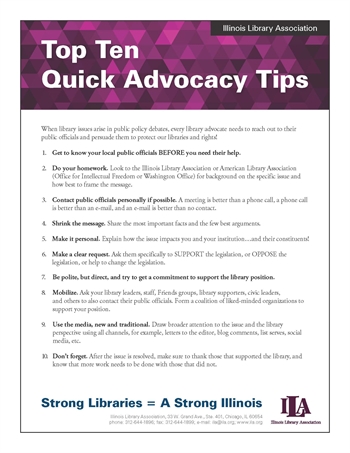- About
-
Advocacy
- Submit Legislative Proposals to the ILA Public Policy Committee
- Advocacy Policies and Procedures
- More Than a Building
- Census 2020 Resources
- Creating or Changing Illinois State Library Law
- Illinois Minimum Wage Resources
- Intro to Property Taxes for IL Libraries
- ILA Public Policy Principles
- Legislative Issues
- Libraries and Immigration Enforcement
- Making Your Case
- Ready, Set, Advocate
- TIFs and Public Library Districts in Illinois
- Top Ten Advocacy Tips
- Unite Against Book Bans in Illinois
-
Committees
- Frequently Asked Questions (FAQ) about ILA Committees
- Advocacy Committee
- Awards Committee
- Conference Program Committee, 2025
- Conference Program Committee, 2026
- Diversity Committee
- Finance Committee
- Fundraising Committee
- ILA Reporter Advisory Committee
- Illinois Libraries Present Committee
- Illinois Public Library Standards Committee
- Intellectual Freedom Committee
- iREAD Committee
- Nominating Committee
- Public Policy Committee
- Reaching Forward North Committee
- Reaching Forward South Committee
- Events
-
Forums
- Frequently Asked Questions (FAQ) about ILA Forums
- Human Resources & Administration Forum (HRAF)
- Illinois Association of College & Research Libraries Forum (IACRL)
- Library Trustee Forum (LTF)
- Marketing Forum (MF)
- Resources & Technical Services Forum (RTSF)
- Retired Members Forum
- Small and Rural Libraries Forum (SARL)
- Students and New Professionals Forum (SANP)
- Young Adult Services Forum (YASF)
- Youth Services Forum (YSF)
- Initiatives
- Membership
- Publications
When library issues arise in public policy debates, every library advocate needs to reach out to their public officials and persuade them to protect our libraries and rights!
- Know your officials. Get to know your local public officials BEFORE you need their help.
- Do your homework. Look to the Illinois Library Association or American Library Association (Office for Intellectual Freedom or Washington Office) for background on the specific issue and how best to frame the message.
- Contact public officials personally if possible. A meeting is better than a phone call, a phone call is better than an e-mail, and an e-mail is better than no contact.
- Shrink the message. Share the most important facts and the few best arguments.
- Make it personal. Explain how the issue impacts you and your institution…and their constituents!
- Make a clear request. Ask them specifically to SUPPORT the legislation, or OPPOSE the legislation, or help to change the legislation.
- Be polite, but direct, and try to get a commitment to support the library position.
- Mobilize. Ask your library leaders, staff, Friends groups, library supporters, civic leaders, and others to also contact their public officials. Form a coalition of liked-minded organizations to support your position.
- Use the media, new and traditional. Draw broader attention to the issue and the library perspective using all channels, for example, letters to the editor, blog comments, list serves, social media, etc.
- Don’t forget. After the issue is resolved, make sure to thank those that supported the library, and know that more work needs to be done with those that did not.


 iREAD Summer Reading Programs
iREAD Summer Reading Programs Latest Library JobLine Listings
Latest Library JobLine Listings